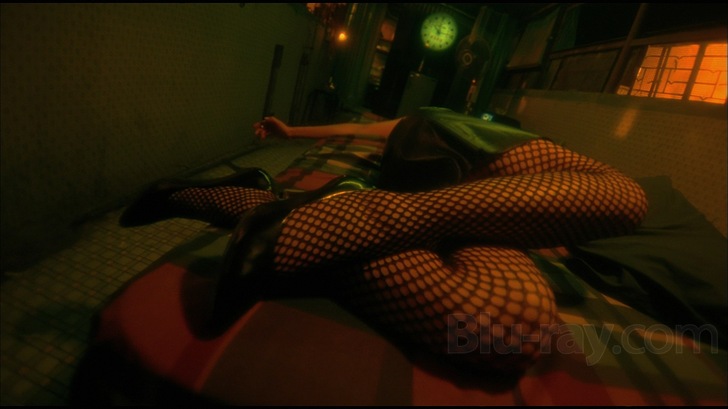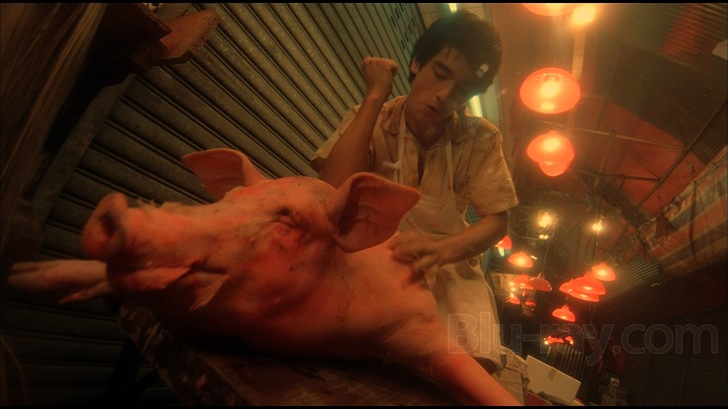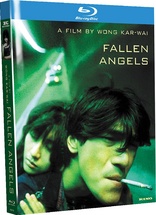Fallen Angels Blu-ray Movie
HomeFallen Angels Blu-ray Movie 
墮落天使 / Do lok tin siKino Lorber | 1995 | 99 min | Not rated | Mar 16, 2010
Movie rating
7.8 | / 10 |
Blu-ray rating
| Users | 4.8 | |
| Reviewer | 4.0 | |
| Overall | 4.1 |
Overview
Fallen Angels (1995)
A hitman finds that the assassin's life has slowly lost its allure. Complicating his life is his beautiful contact who pines after him with fetishistic ardor, although the two have never met in their nearly three-year partnership. In another part of the city, Ho, a mute, boyish ex-convict, makes a living by sneaking into and running businesses after hours. Still living with his father who runs the Chungking Mansions hotel, the restless Ho falls for Cherry, a woman getting over her breakup with the offscreen Johnny.
Starring: Michelle Reis, Takeshi Kaneshiro, Karen Mok, Charlie Yeung, Leon LaiDirector: Wong Kar-wai
| Foreign | Uncertain |
| Drama | Uncertain |
| Romance | Uncertain |
| Crime | Uncertain |
Specifications
Video
Video codec: MPEG-4 AVC
Video resolution: 1080p
Aspect ratio: 1.79:1
Original aspect ratio: 1.85:1
Audio
Cantonese: DTS-HD Master Audio 5.1 (48kHz, 24-bit)
Subtitles
English
Discs
50GB Blu-ray Disc
Single disc (1 BD)
Playback
Region free
Review
Rating summary
| Movie | 4.0 | |
| Video | 4.0 | |
| Audio | 4.0 | |
| Extras | 2.5 | |
| Overall | 4.0 |
Fallen Angels Blu-ray Movie Review
Now Chungking Express doesn't have to be alone on your Blu-ray shelf.
Reviewed by Casey Broadwater March 18, 2010Originally envisioned as the third part of director Wong Kar-Wai’s Chungking Express—a film that tells two parallel stories of urban ennui and heartbreak—Fallen Angels is a companion piece and pseudo-sequel that builds upon the themes of its predecessor, giving us an intoxicating view of pre-millennial, pre-British handover Hong Kong, as seen through the eyes of four disparate souls, all stuck in the existential doldrums of big city loneliness. Each film can stand quite assuredly on its own, but seeing Chungking Express first truly does enrich the experience of watching and mentally engaging in Fallen Angels—which almost requires active participation—as both films bleed together with recurring visual motifs, reused locations, and repeated narrative touchstones. Ultimately, I think Chungking Express is the better film—it’s less sprawling and more emotionally direct—but together they form a cohesive, poetic, and exuberant whole that isn’t to be missed by fans of Asian art-house cinema.

"I'm feeling such warmth this very moment."
As with Chungking Express, Fallen Angels traces the paths of two pairs of temporarily star-crossed lovers, destined only for brief encounters, ill-fated romances that are ephemeral at best. Wong Chi-Ming (Leon Lai) is a professional assassin with a gorgeous female “agent” (Michelle Reis), a faux femme fatale in a patent leather dress and fishnet stockings, who arranges all of his hits, handles the money, and tidies up his dingy apartment under the train tracks. Only, they never meet, communicating only by code and phone and dropbox. She learns about him by going through his garbage, and lies on the bed that they share—but never share—dreaming of his touch. He, however, believes business partners should never get “too involved,” and leaves disparaging clues at her favorite bar in the lyrics of Cantonese pop songs.
Intercut with the assassin’s story, we also follow He Zhiwu (Takeshi Kaneshiro), a petty criminal —perhaps the pettiest criminal—who makes a living breaking into stores at night and “re-opening” them, often foisting his appropriated wares on an unsuspecting public, who finally cough up cash just to get him out of their hair. (Literally, in one case, as he forcibly shampoos one customer’s head in a commandeered barber shop.) Inexplicably mute from the time he ate an expired can of pineapple chunks—which, if you remember, were of utmost importance to the character Kaneshiro played in Chungking Express—He Zhiwu falls for a phone line- hogging chattermouth named Charlie (Charlie Yeung), a temperamental woman on the rebound and out to get revenge on Blondie (Karen Mok), presumably her ex-lover’s temptress, who may or may not be the blond-haired minx that our assassin friend Wong Chi-Ming is casually seeing.
Parsing the intricacies of Fallen Angels’ plot is a bit like trying to explain what’s going on in a dense abstract painting—so much is happening, and there are so many visual cues to notice and dissect, but what’s most important is the overall impression, the instinctive mood of the piece, its texture and fluidity. Wong Kar-Wai’s three “middle period” films, from Chungking Express to Happy Together, are a stylistic mashup of French New Wave, cross- processed fashion photography, and a distinctly Asian idea of impermanence and imperfection, a vérité cinema of hand-held spontaneity, cluttered with color, and tilt-shift focused on the scrap- of-newspaper-in-the-wind transience of modern urban life.
These films—especially Fallen Angels—have faced the age-old critical charge of style over substance, but for Wong Kar-Wai, his style is thematic substance, a post-modern way to reflect the squalor and irrepressible life of dim back rooms with sickly fluorescent lighting, tile walls covered in mold, steam-filled kitchens, crowded noodle shops, and tiny apartments that rattle with the passing of an overhead train. Here, the use of chopped up, slowed down, and sped up frame rates manipulates time palpably, compressing hours into a few moments and making a split-second gun battle seem to last an eternity. Cinematographer Chris Doyle’s extremely wide- angle, fish-eye lenses create a literally in-your-face image that bulges grotesquely, pushing the film’s world so close that we can practically smell the ramen and dim sum. Watching Chungking Express and Fallen Angels as a Westerner is the arm-chair equivalent of stumbling half-drunkenly through Hong Kong, only, WKW takes you to all the seedy nightspots and out-of-the-way dives specifically not listed in your Lonely Planet guidebook. It’s the closest you’re going to get to the city’s seamy underbelly without a tourist’s visa and a considerable amount of courage.
Lonely Planet wouldn’t be a bad alternate title for Fallen Angels, actually, as the film’s overarching theme seems to be the fleetingness of modern relationships, the way lives randomly intersect, rub elbows for a few moments, and part ways. But it’s not all emptiness and despair. The most telling scene of Wong Kar-Wai’s philosophy for the film is at the end, when— and, no spoiler alert required, this is depicted on the cover art—the mute He Zhiwu and the assassin’s “agent,” who have just met, are speeding through a tunnel on a motorbike toward morning. “I haven't ridden a motorcycle for a long time,” the agent says. “Actually, I haven't been so close to a man for a while. The road isn't that long, and I know I'm getting off soon. But I'm feeling such warmth this very moment." The italics are mine, of course, but the words might as well by Wong Kar-Wai’s thesis for Fallen Angels, a film consumed with the transcendent quality of “the moment," the ultimate—and only—reality.
Fallen Angels Blu-ray Movie, Video Quality 

Highly stylized and shot with compulsive spontaneity at night—relying heavily on natural or single-source lighting—Fallen Angels expands on many of the visual ideas that Wong Kar- Wai and cinematographer Chris Doyle experimented with in Chungking Express. The stutter and blur of dropped frames once again makes an appearance, slow-motion foregrounds are contrasted against the prodigious buzz of background activity, and strong chiaroscuro shadows drape Hong Kong's seediest recesses, while neon lights bathe wet asphalt with glitters of color. And it all looks beautifully intoxicating in motion, a quality that the screenshots in this review can only approximate. Kino International's 1080p/AVC-encoded transfer is every bit as true-to-source as Criterion's treatment of Chungking Express, and if you've ever owned a DVD copy of the film, you'll notice an immediate and substantial improvement. Newcomers shouldn't expect a razor sharp or crystal clean image—from the moment it entered Doyle's camera, the picture has always been gritty and slightly soft—but the increased resolution allows for plenty of previously unforeseen detail. Color has also been nicely balanced out, repairing the often harsh oversaturation of previous releases. Cast in fluorescent greens and vibrant neons, the film's palette portrays Hong Kong as simultaneously sickly and full of life, and skin tones follow suite. The source print is in terrific condition, compression-related quirks are largely absent, and the film's chunky grain structure—a natural byproduct of shooting at night on high-speed film— has been untouched by DNR or other heavy filtering. I simply can't imagine Fallen Angels looking much better than it does here.
Fallen Angels Blu-ray Movie, Audio Quality 

Fallen Angels' impressionistic audio experience is nearly as stylized as its visuals, and with that taken into account, this disc's Cantonese DTS-HD Master Audio 5.1 surround track is a blissful head-trip, floating on lush trip-hop-ish music with deep throbs of bass and an almost metallic sounding snare drum. As in Chungking Express, Wong Kar-Wai's use of music in Fallen Angels is the glue that holds the film's thematic resonance together, and this track handles it brilliantly, blasting the big mid-90s beats and Cantonese pop numbers with power and detail. The other elements of the sound design are just as effective, but not always as consistent. The rear speakers occasionally burst to life with immersive ambience, like pouring rain, or shudder with the cross channel whizzes and pops of gunfire, but then you'll have chaotic scenes that seem like they could have a lot of audio activity, where the sound is actually quite restrained. It all comes down to intent, though, and in these quieter moments you get the feeling that your attention is purposefully being directed elsewhere. There is one moment in an ice cream truck when the characters' voices sound conspicuously hollow, but other than that, dialogue is clear and perfectly balanced. For us non-Cantonese-speaking viewers, the optional English subtitles are presented in clean white lettering that's easy to read.
Fallen Angels Blu-ray Movie, Special Features and Extras 

Featurettes
The disc includes a trio of mostly substance-less featurettes. There's not much here to satiate
hardcore Wong Kar-Wai followers, but the 15-or-so minutes of extra content is not without its
charms. In Only
You (1080i, 7:47), director Wong Kar-Wai briefly discusses the relationship between
Chungking Express and Fallen Angels, followed by a montage of deleted scenes.
Whom You Miss (1080i, 3:54) is a profile of Chan Man-Lei, the real-life manager of the
Chungking Mansions Hotel, who was asked by Wong Kar Wai to act in Fallen Angels.
Lastly, in A Beautiful Evening (1080i, 3:50), Wong Kar-Wai gives some insight into the
shooting process—especially regarding the use of the fisheye lenses—and talks about how
Fallen Angels gave his crew the confidence to shoot anywhere, under any conditions. Do
note that while the image is technically in 1080i, this is just upscaled, windowboxed
video.
Interview with D.P. Chris Doyle (1080i, 7:15)
Longtime Wong Kar-Wai cinematographer and Australian ex-pat Chris Doyle—who always gives a
nutty, typically alcohol-assisted interview—discusses color theory, his role as DP as it relates to
the actors, and Fallen Angels' unique visual style.
Stills Gallery (1080p)
A user-directed gallery with 32 stills.
Happy Together Trailer (1080p, 1:31)
Fallen Angels Trailer (1080p, 2:43)
Fallen Angels Blu-ray Movie, Overall Score and Recommendation 

Though not as narratively concise or emotionally affecting as Chungking Express, Fallen Angels is an engrossing follow-up that explores similar ideas and is filmed with Wong Kar-Wai's characteristically breakneck brilliance. You really can't have one without the other, and thankfully, both films have received excellent high definition home video treatments, with Criterion releasing Chungking Express in late 2008, and Kino International equaling the big C's efforts with a beautiful new transfer of Fallen Angels. Highly Recommended!
Similar titles
Similar titles you might also like

As Tears Go By
Wong gok ka moon
1988

Happy Together
春光乍洩 / Chun gwong cha sit
1997

Days of Being Wild
阿飛正傳 / Ah fei zing zyun / Theatrical and Alternate versions
1990

The Hand
Director's Cut | included with "World of Wong Kar Wai" release
2004

2046
2004

Chungking Express 4K
重慶森林 / Chung Hing sam lam
1994

In the Mood for Love 4K
花樣年華 | Faa yeung nin wa | includes 2021 remastered BD
2000

Ashes of Time
東邪西毒 / Dung che sai duk / Ashes of Time Redux
1994

Yi Yi
2000

Bay of Angels
La baie des anges
1963

Pierrot le fou
1965

A Brighter Summer Day
牯嶺街少年殺人事件
1991

Crisis
Kris
1946

Saraband
2003

Summer Interlude
Sommarlek
1951

Summer with Monika
Sommaren med Monika | Original Uncut version
1953

Variety Lights
Luci del varietà
1950

From the Life of the Marionettes
Aus dem Leben der Marionetten
1980

Drive My Car
ドライブ・マイ・カー / Doraibu mai kâ
2021

Claire's Knee
Le genou de Claire
1970

